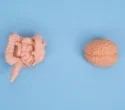
An individual’s health and neuropsychiatric condition can be affected by both internal and external factors, such as their food habits, way of life, and use of medications. Together with genetics, inflammation, and neurotransmitter dysregulation, lifestyle choices are regarded as one of the contributing factors to the multifactorial etiology of psychiatric disorders because of their major effects on the interaction between the gut microbiota and the brain.
In order to promote general health and wellbeing, dietary considerations are extremely important. Culture, religion, and society all have an impact on the natural human feeding pattern. It has been discovered that a high-fat diet (HFD), which predominantly comprises of saturated and/or trans fats, alters the microbiota’s makeup.
Antibiotics are a family of drugs that are frequently used to treat a variety of.
Use of antibiotics has a considerable negative impact on the composition and function of the intestinal microbiota by upsetting the harmony between populations that are mutually helpful, which has long-lasting negative effects on the host. High doses of antibiotics or continuous antibiotic use can affect the brain and intestinal levels significantly or cause irreparable damage.The main causes of major depressive disorder (MDD) are complex interactions between environmental, biochemical, and genetic factors that contribute to the development and maintenance of the condition.
Antidepressant medication is currently the most popular way to treat MDD. These drugs function by lowering the levels of the respective brain transporters, like serotonin and norepinephrine, and raising the concentrations of neurotransmitters in the synaptic cleft. The gastrointestinal tract, which is intricately coupled to or influenced by the gut microbiota, contains the transporters and receptors linked to depression.
According to recent studies, it is advised that while creating innovative psychotropic medications to treat mental disorders, the host microbiota be given major consideration. This is due to the fact that a variety of antidepressants have antibacterial capabilities against common strains identified in the






